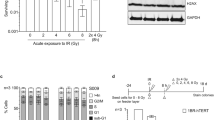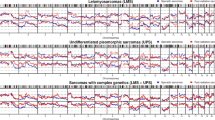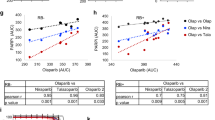Abstract
Background
p53 plays a key role in the DNA repair process and response to ionising radiation. We sought to determine the clinical phenotype of TP53 mutations and p53 pathway alterations in patients with rhabdomyosarcoma (RMS) and Ewing sarcoma (ES) treated with radiation.
Methods
Of patients with available genomic sequencing, we identified 109 patients with RMS and ES treated to a total of 286 radiation sites. We compared irradiated tumour control among tumours with TP53 mutations (n = 40) to those that were TP53 wild-type (n = 246). We additionally compared irradiated tumour control among tumours with any p53 pathway alteration (defined as tumours with TP53 mutations or TP53 wild-type tumours identified to have MDM2/4 amplification and/or CDKN2A/B deletion, n = 78) to those without such alterations (n = 208).
Results
The median follow-up was 26 months from radiation. TP53 mutations were associated with worse irradiated tumour control among the entire cohort (hazard ratio, HR = 2.8, P < 0.0001). Tumours with any p53 pathway alteration also had inferior irradiated tumour control (HR = 2.0, P = 0.003). On multivariable analysis, after controlling for tumour histology, intent of radiation, presence of gross disease, and biologically effective dose, TP53 mutations continued to be associated with a radioresistant phenotype (HR = 7.1, P < 0.0001).
Conclusions
Our results show that TP53 mutations are associated with increased radioresistance in RMS and ES. Novel strategies to overcome this radioresistance are important for improved outcomes in p53 disruptive RMS and ES.
This is a preview of subscription content, access via your institution
Access options
Subscribe to this journal
Receive 24 print issues and online access
$259.00 per year
only $10.79 per issue
Buy this article
- Purchase on Springer Link
- Instant access to full article PDF
Prices may be subject to local taxes which are calculated during checkout



Similar content being viewed by others
References
Grunewald, T. G. P., Cidre-Aranaz, F., Surdez, D., Tomazou, E. M., de Alava, E., Kovar, H. et al. Ewing sarcoma. Nat. Rev. Dis. Prim. 4, 5 (2018).
Skapek, S. X., Ferrari, A., Gupta, A. A., Lupo, P. J., Butler, E., Shipley, J. et al. Rhabdomyosarcoma. Nat. Rev. Dis. Prim. 5, 1 (2019).
Casey, D. L., Chi, Y. Y., Donaldson, S. S., Hawkins, D. S., Tian, J., Arndt, C. A. et al. Increased local failure for patients with intermediate-risk rhabdomyosarcoma on ARST0531: a report from the Children’s Oncology Group. Cancer 125, 3242–3248 (2019).
Ahmed, S. K., Randall, R. L., DuBois, S. G., Harmsen, W. S., Krailo, M., Marcus, K. J. et al. Identification of patients with localized Ewing sarcoma at higher risk for local failure: a report from the Children’s Oncology Group. Int. J. Radiat. Oncol. Biol. Phys. 99, 1286–1294 (2017).
Haupt, Y., Maya, R., Kazaz, A. & Oren, M. Mdm2 promotes the rapid degradation of p53. Nature 387, 296–299 (1997).
Stott, F. J., Bates, S., James, M. C., McConnell, B. B., Starborg, M., Brookes, S. et al. The alternative product from the human CDKN2A locus, p14(ARF), participates in a regulatory feedback loop with p53 and MDM2. EMBO J. 17, 5001–5014 (1998).
Zhukova, N., Ramaswamy, V., Remke, M., Martin, D. C., Castelo-Branco, P., Zhang, C. H. et al. WNT activation by lithium abrogates TP53 mutation associated radiation resistance in medulloblastoma. Acta Neuropathol. Commun. 2, 174 (2014).
Werbrouck, C., Evangelista, C. C. S., Lobon-Iglesias, M. J., Barret, E., Le Teuff, G., Merlevede, J. et al. TP53 pathway alterations drive radioresistance in diffuse intrinsic pontine gliomas (DIPG). Clin. Cancer Res. 25, 6788–6800 (2019).
Yogev, O., Barker, K., Sikka, A., Almeida, G. S., Hallsworth, A., Smith, L. M. et al. p53 loss in MYC-driven neuroblastoma leads to metabolic adaptations supporting radioresistance. Cancer Res. 76, 3025–3035 (2016).
Akiyama, A., Minaguchi, T., Fujieda, K., Hosokawa, Y., Nishida, K., Shikama, A. et al. Abnormal accumulation of p53 predicts radioresistance leading to poor survival in patients with endometrial carcinoma. Oncol. Lett. 18, 5952–5958 (2019).
Skinner, H. D., Sandulache, V. C., Ow, T. J., Meyn, R. E., Yordy, J. S., Beadle, B. M. et al. TP53 disruptive mutations lead to head and neck cancer treatment failure through inhibition of radiation-induced senescence. Clin. Cancer Res. 18, 290–300 (2012).
Lerman, D. M., Monument, M. J., McIlvaine, E., Liu, X. Q., Huang, D., Monovich, L. et al. Tumoral TP53 and/or CDKN2A alterations are not reliable prognostic biomarkers in patients with localized Ewing sarcoma: a report from the Children’s Oncology Group. Pediatr. Blood Cancer 62, 759–765 (2015).
Casey, D. L., Wexler, L. H., Pitter, K. L., Samstein, R. M., Slotkin, E. K. & Wolden, S. L. Genomic determinants of clinical outcomes in rhabdomyosarcoma. Clin. Cancer Res. 26, 1135–1140 (2020).
de Alava, E., Antonescu, C. R., Panizo, A., Leung, D., Meyers, P. A., Huvos, A. G. et al. Prognostic impact of P53 status in Ewing sarcoma. Cancer 89, 783–792 (2000).
Huang, H. Y., Illei, P. B., Zhao, Z., Mazumdar, M., Huvos, A. G., Healey, J. H. et al. Ewing sarcomas with p53 mutation or p16/p14ARF homozygous deletion: a highly lethal subset associated with poor chemoresponse. J. Clin. Oncol. 23, 548–558 (2005).
Tirode, F., Surdez, D., Ma, X., Parker, M., Le Deley, M. C., Bahrami, A. et al. Genomic landscape of Ewing sarcoma defines an aggressive subtype with co-association of STAG2 and TP53 mutations. Cancer Discov. 4, 1342–1353 (2014).
Chen, X., Bahrami, A., Pappo, A., Easton, J., Dalton, J., Hedlund, E. et al. Recurrent somatic structural variations contribute to tumorigenesis in pediatric osteosarcoma. Cell Rep. 7, 104–112 (2014).
Poeta, M. L., Manola, J., Goldwasser, M. A., Forastiere, A., Benoit, N., Califano, J. A. et al. TP53 mutations and survival in squamous-cell carcinoma of the head and neck. N. Engl. J. Med. 357, 2552–2561 (2007).
Cancer Genome Atlas, N. Comprehensive molecular portraits of human breast tumours. Nature 490, 61–70 (2012).
McIlwrath, A. J., Vasey, P. A., Ross, G. M. & Brown, R. Cell cycle arrests and radiosensitivity of human tumor cell lines: dependence on wild-type p53 for radiosensitivity. Cancer Res. 54, 3718–3722 (1994).
Siles, E., Villalobos, M., Valenzuela, M. T., Nunez, M. I., Gordon, A., McMillan, T. J. et al. Relationship between p53 status and radiosensitivity in human tumour cell lines. Br. J. Cancer 73, 581–588 (1996).
Shu, H. K., Kim, M. M., Chen, P., Furman, F., Julin, C. M. & Israel, M. A. The intrinsic radioresistance of glioblastoma-derived cell lines is associated with a failure of p53 to induce p21(BAX) expression. Proc. Natl Acad. Sci. USA 95, 14453–14458 (1998).
Curtin, N. J. DNA repair dysregulation from cancer driver to therapeutic target. Nat. Rev. Cancer 12, 801–817 (2012).
Ma, C. X., Cai, S., Li, S., Ryan, C. E., Guo, Z., Schaiff, W. T. et al. Targeting Chk1 in p53-deficient triple-negative breast cancer is therapeutically beneficial in human-in-mouse tumor models. J. Clin. Investig. 122, 1541–1552 (2012).
Vance, S., Liu, E., Zhao, L., Parsels, J. D., Parsels, L. A., Brown, J. L. et al. Selective radiosensitization of p53 mutant pancreatic cancer cells by combined inhibition of Chk1 and PARP1. Cell Cycle 10, 4321–4329 (2011).
Zhang, Y., Lai, J., Du, Z., Gao, J., Yang, S., Gorityala, S. et al. Targeting radioresistant breast cancer cells by single agent CHK1 inhibitor via enhancing replication stress. Oncotarget 7, 34688–34702 (2016).
Kwok, M., Davies, N., Agathanggelou, A., Smith, E., Oldreive, C., Petermann, E. et al. ATR inhibition induces synthetic lethality and overcomes chemoresistance in TP53- or ATM-defective chronic lymphocytic leukemia cells. Blood 127, 582–595 (2016).
Reaper, P. M., Griffiths, M. R., Long, J. M., Charrier, J. D., Maccormick, S., Charlton, P. A. et al. Selective killing of ATM- or p53-deficient cancer cells through inhibition of ATR. Nat. Chem. Biol. 7, 428–430 (2011).
Mikami, K., Medova, M., Nisa, L., Francica, P., Gluck, A. A., Tschan, M. P. et al. Impact of p53 status on radiosensitization of tumor cells by MET inhibition-associated checkpoint abrogation. Mol. Cancer Res. 13, 1544–1553 (2015).
Hafsi, H., Dillon, M. T., Barker, H. E., Kyula, J. N., Schick, U., Paget, J. T. et al. Combined ATR and DNA-PK inhibition radiosensitizes tumor cells independently of their p53 status. Front. Oncol. 8, 245 (2018).
Ortiz, T., Burguillos, M. A., Lopez-Lluch, G., Navas, P., Herrador, M., Gonzalez, I. et al. Enhanced induction of apoptosis in a radio-resistant bladder tumor cell line by combined treatments with X-rays and wortmannin. Radiat. Environ. Biophys. 47, 445–452 (2008).
Kumar, R. J., Chao, H. X., Simpson, D. A., Feng, W., Cho, M. G., Roberts, V. R. et al. Dual inhibition of DNA-PK and DNA polymerase theta overcomes radiation resistance induced by p53 deficiency. NAR Cancer. 2, zcaa038 (2020).
Author information
Authors and Affiliations
Contributions
D.L.C., K.L.P., L.H.W., E.K.S., G.P.G. and S.L.W. designed the study. D.L.C., K.L.P., L.H.W. and S.L.W. collected the data. D.L.C., K.L.P., L.H.W., E.K.S., G.P.G. and S.L.W. contributed to the formal analysis and methodology. D.L.C., K.L.P. and S.L.W. wrote the original draft. D.L.C., K.L.P., L.H.W., E.K.S., G.P.G. and S.L.W. reviewed and edited.
Corresponding author
Ethics declarations
Ethics approval and consent to participate
Consent for genomic testing was obtained under the prospective protocol (#12–245) through the Memorial Sloan Kettering Cancer Center Institutional Review Board. Consent to participate in this retrospective analysis was waived by the Memorial Sloan Kettering Cancer Center Institutional Review Board approved protocol (#16–1125). This study was performed in accordance with the Declaration of Helsinki.
Consent to publish
No personal data or identifying information are being submitted.
Data availability
Data are relevant to MSKCC patients and not publicly available. We will make de-identified data available upon request after institutional approval.
Competing interests
D.L.C., K.L.P., L.H.W., E.K.S., G.P.G. and S.L.W. declare no competing interests. L.H.W. held a consultant position at EUSA Pharma in 2019, not relevant to this work.
Funding information
National Institutes of Health/National Cancer Institute Cancer Center Support Grant (P30CA008748).
Additional information
Publisher’s note Springer Nature remains neutral with regard to jurisdictional claims in published maps and institutional affiliations.
Supplementary information
Rights and permissions
About this article
Cite this article
Casey, D.L., Pitter, K.L., Wexler, L.H. et al. TP53 mutations increase radioresistance in rhabdomyosarcoma and Ewing sarcoma. Br J Cancer 125, 576–581 (2021). https://doi.org/10.1038/s41416-021-01438-2
Received:
Revised:
Accepted:
Published:
Issue Date:
DOI: https://doi.org/10.1038/s41416-021-01438-2
This article is cited by
-
LINC00963-FOSB-mediated transcription activation of UBE3C enhances radioresistance of breast cancer cells by inducing ubiquitination-dependent protein degradation of TP73
Journal of Translational Medicine (2023)
-
Radiotherapy in bone sarcoma: the quest for better treatment option
BMC Cancer (2023)
-
Bibliometric analysis of Ewing sarcoma from 1993 to 2022
BMC Cancer (2023)
-
Non-chemotherapy adjuvant agents in TP53 mutant Ewing sarcoma
Scientific Reports (2023)
-
Predicting tumour radiosensitivity to deliver precision radiotherapy
Nature Reviews Clinical Oncology (2023)



